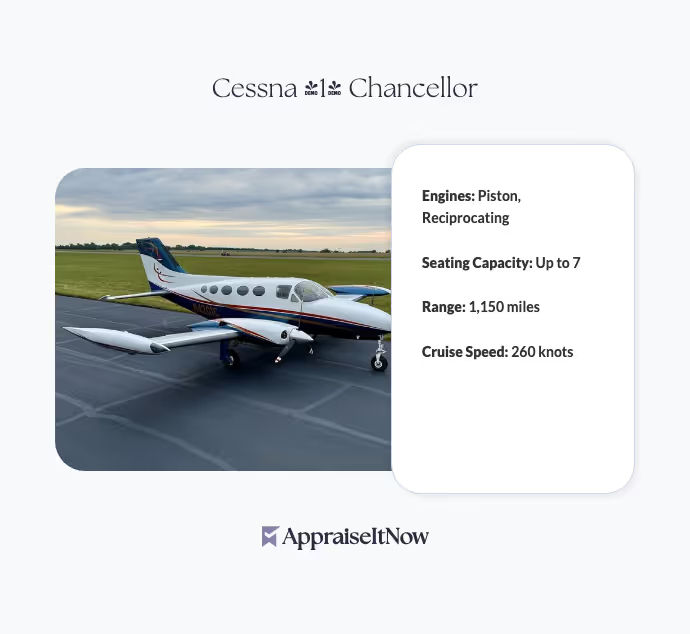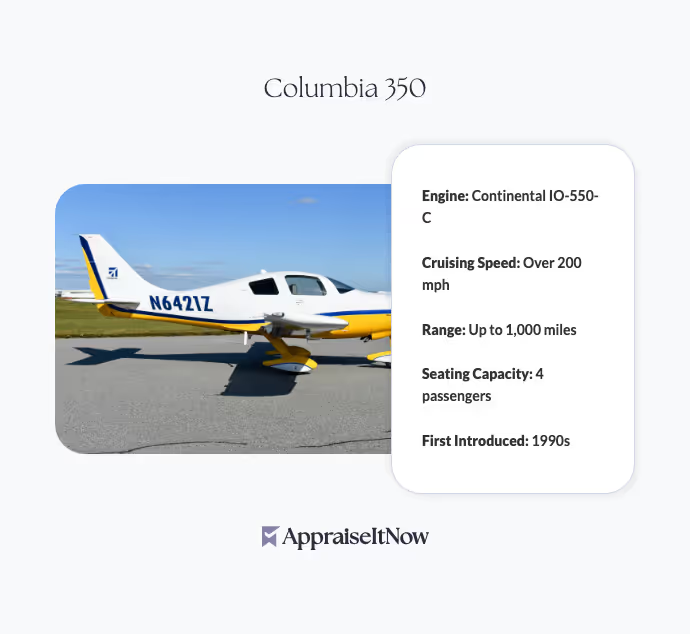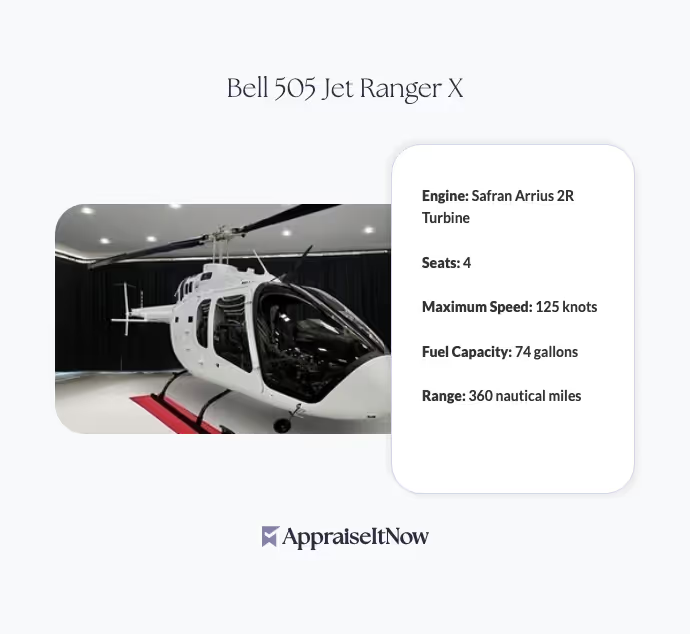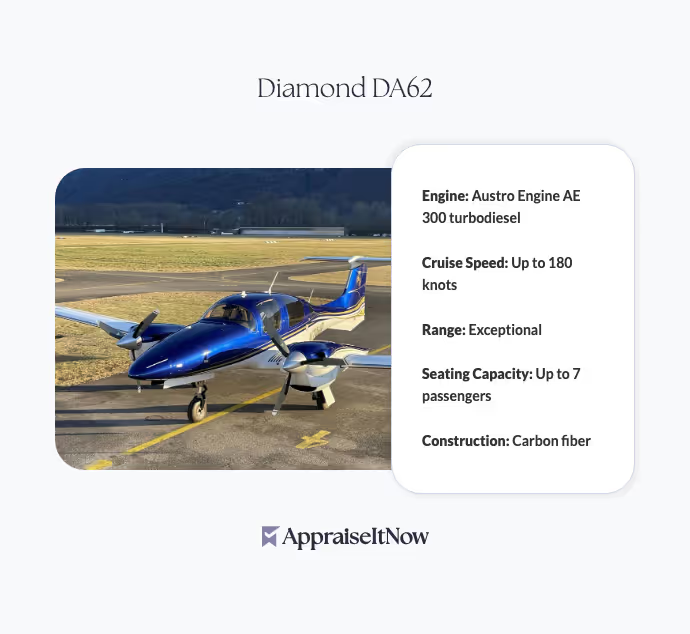<h1>How to Get Your Cessna 414 Chancellor Appraised</h1>
<p>The Cessna 414 Chancellor represents a significant investment for pilots and business owners alike. Whether you're buying, selling, insuring, or managing an estate, understanding how to properly appraise this twin-engine aircraft ensures you have accurate documentation and fair market valuation. A professional appraisal of your Cessna 414 Chancellor typically reveals values between <strong>$150,000 and $250,000</strong>, depending on multiple factors that extend far beyond the aircraft's age.</p>
<h2>Understanding Cessna 414 Chancellor Value Drivers</h2>
<p>Your Cessna 414 Chancellor's worth depends on several interconnected factors that experienced appraisers evaluate systematically. The aircraft's <strong>pressurized cabin, retractable landing gear, and turbocharged twin engines</strong> create a versatile platform that commands premium pricing compared to non-pressurized alternatives. First introduced in 1969, the Chancellor has maintained steady collector interest due to its proven reliability and spacious seven-passenger capacity, making it viable for personal transportation and charter operations alike.</p>
<p>When evaluating "how much is a Cessna 414 Chancellor," you're essentially asking what current market conditions will bear for an aircraft with specific hours, maintenance history, and features. The <strong>all-metal construction</strong> provides durability that supports long-term value retention, while IFR certification and upgraded avionics significantly enhance resale appeal to serious buyers seeking mission-capable aircraft.</p>
<div class="callout tip"><p><strong>Appraisal Insight</strong></p>
<p>Aircraft with comprehensive maintenance logs and upgrade documentation typically appraise 15-25% higher than comparable examples with incomplete records.</p></div>
<h2>Aircraft History and Market Position</h2>
<p>Production history directly influences Cessna 414 Chancellor appraisals. Approximately <strong>1,100 aircraft</strong> were manufactured during the model's production run, creating a substantial but not oversaturated market. This production volume contrasts favorably with ultra-rare aircraft, meaning your Chancellor should find interested buyers or insurers without excessive difficulty. The aircraft's proven track record across military, civilian, and commercial operations reinforces its desirability within the aircraft and commercial aircraft appraisal categories.</p>
<p>Understanding your Chancellor's specific manufacture year helps appraisers assess component obsolescence and parts availability. Earlier models (1969-1980s) may require more specialized sourcing for certain avionics or mechanical components, potentially affecting both operation costs and market perception. Later production aircraft (1990s and early 2000s) typically command premium pricing due to improved electronics, more efficient engines, and enhanced cabin pressurization systems that better serve modern pilot expectations.</p>
<h2>Critical Factors in Your Cessna 414 Chancellor Appraisal</h2>
<p>Professional appraisers examine specific characteristics when determining your aircraft's value within the broader market range. Unlike automobiles where mileage dominates valuation, aircraft appraisals require evaluating <strong>total flight hours, engine time since overhaul, and maintenance condition</strong> as primary value drivers.</p>
<p>Your aircraft's <strong>avionics package</strong> significantly impacts appraisal results. A well-equipped panel featuring modern glass cockpit systems or recently upgraded autopilot equipment can justify valuations at the higher end of the range, while older analog instrumentation may reduce assessed value. Similarly, the aircraft's <strong>interior condition</strong> affects perceived value—professional refurbishment of seats, carpeting, and cabin furnishings demonstrates owner commitment and supports appraisal pricing.</p>
<p>Engine condition represents perhaps the most critical technical factor. Since the 414 Chancellor features twin turbocharged powerplants, appraisers closely examine <strong>time since last overhaul, cylinder condition, and compression test results</strong>. An aircraft with freshly overhauled engines typically appraises 20-30% higher than comparable models requiring imminent engine work, as buyers factor substantial replacement costs (often $15,000-25,000 per engine) into their purchase calculations.</p>
<div class="callout note"><p><strong>Technical Consideration</strong></p>
<p>Cylinder jug replacement and detailed engine inspections significantly influence whether your Cessna 414 Chancellor appraises at $150,000 or approaches the $250,000 ceiling.</p></div>
<h2>Operational and Insurance Valuation Purposes</h2>
<p>Your reasons for seeking an appraisal shape how professionals evaluate your Cessna 414 Chancellor. Insurance companies require <strong>replacement cost valuations</strong> that reflect actual market pricing for aircraft in similar condition—essentially fair market value documentation that protects your investment. For insurance purposes, appraisers focus on current comparable sales data and condition assessment rather than historical pricing or sentimental value.</p>
<p>Estate planning presents different appraisal challenges. When your Cessna 414 Chancellor becomes part of estate settlement or asset distribution, appraisers must provide <strong>defensible valuations</strong> that satisfy tax authorities and beneficiaries alike. This requires comprehensive documentation of comparable sales, market demand indicators, and condition specifics that withstand professional scrutiny.</p>
<p>If you're considering the operating costs before purchase, understanding "what is the cost to own a Cessna 414 per year" helps contextualize appraisal values. Annual operating expenses typically range from <strong>$25,000 to $35,000</strong>, including fuel, maintenance reserves, hangar, and insurance. This context helps justify pricing within the $150,000-250,000 range by demonstrating the aircraft's suitability for serious business and personal use.</p>
<h2>Operating Economics and Hourly Costs</h2>
<p>The question "how much does it cost to operate a Cessna 414 per hour" directly relates to appraised value, as operating expenses influence buyer willingness to pay. Professional operators expect <strong>$800 to $1,200 per flight hour</strong> when accounting for fuel consumption of approximately 40-50 gallons per hour, engine reserve contributions, maintenance, and miscellaneous expenses. This moderate operating cost relative to larger twin-engine aircraft supports the 414's strong market positioning and appraisal stability.</p>
<p>Charter operators considering fleet acquisition frequently reference hourly operating costs when evaluating aircraft investment decisions. Understanding these economics helps explain why your Cessna 414 Chancellor maintains steady appraised values—the aircraft delivers capable twin-engine performance with reasonable operating expenses, making it attractive to cost-conscious operators managing commercial flight operations.</p>
<h2>Pressurization and Equipment Features</h2>
<p>The 414 Chancellor's <strong>pressurized cabin capability</strong> represents a significant value differentiator compared to non-pressurized competitors. Pressurization allows comfortable operations at higher altitudes, reducing weather encounters and enabling more reliable scheduling for business travel. This feature alone can justify $30,000-50,000 in pricing premium, directly impacting whether your aircraft appraises toward the lower or upper end of the range.</p>
<p>Your appraisal will carefully document specific equipment installed. Modern <strong>glass cockpit avionics</strong>, autopilot systems, and weather radar represent substantial value-adding upgrades. An aircraft equipped with Garmin G1000 or G1000 NXi systems typically commands 20-25% appraisal premium over comparable aircraft with older steam gauge instrumentation. These upgrades reduce pilot workload on long flights and improve safety margins, justifying premium pricing to both insurers and potential buyers.</p>
<h2>Market Comparables and Recent Sales Data</h2>
<p>Professional appraisers base Cessna 414 Chancellor valuations on <strong>documented comparable sales</strong> from the past 12-24 months. Unlike personal property or household goods appraisals, aircraft values depend heavily on market transaction evidence. Your appraiser will research similar aircraft that sold through broker channels, at auctions, or in private transactions to establish realistic market value.</p>
<p>Regional factors influence comparable sales data. Aircraft markets in areas with strong business aviation activity (major metropolitan areas, energy sectors, or mountain regions) may support higher appraisals than markets with limited demand. Your appraiser considers local buyer concentration, available financing for aircraft purchases, and seasonal demand fluctuations when selecting relevant comparables and establishing fair market value.</p>
<div class="callout tip"><p><strong>Market Reality</strong></p>
<p>Aircraft appraised for sale purposes often reflect slightly lower values than insurance appraisals, as sellers factor in broker commissions (6-8%) and negotiation flexibility that buyers expect.</p></div>
<h2>Documentation Required for Professional Appraisal</h2>
<p>Obtaining a credible appraisal requires comprehensive aircraft documentation. Your appraiser will request <strong>the aircraft's logbooks</strong>, including airframe time records, engine times since overhaul, and maintenance history spanning years or decades. These records establish whether your Cessna 414 Chancellor has received appropriate care and scheduled maintenance, directly impacting valuation confidence.</p>
<p>Your <strong>FAA registration certificate (N-number documentation)</strong> confirms legal ownership and helps appraisers verify aircraft history through FAA databases. Supplemental <strong>airworthiness directives compliance records</strong> demonstrate that the aircraft meets current regulatory standards. Recent <strong>condition and maintenance inspections</strong> from certified mechanics or avionics technicians provide independent third-party assessment that strengthens appraisal credibility and buyer confidence.</p>
<p>Insurance documents, previous appraisals, and any <strong>aircraft modification records</strong> complete the documentation package. These materials help appraisers understand your aircraft's specific configuration, upgrade history, and maintenance investments. Professional appraisers from certified firms like <strong>AppraiseItNow</strong> can connect you with avionics and mechanical specialists who provide detailed condition assessments supporting accurate valuations across the $150,000-250,000 range.</p>
<h2>Specialty Features and Charter Operations</h2>
<p>Charter operators frequently ask "how much does it cost to charter a Cessna 414" to understand competitive positioning—this market insight also influences appraisal values. Aircraft actively used in charter or fractional ownership programs often appraise slightly lower due to higher utilization and associated wear, though regular professional maintenance may offset these concerns. Conversely, an aircraft maintained to charter-standard specifications commands premium pricing even if not actively flying revenue missions.</p>
<p>Your Cessna 414 Chancellor's <strong>seven-passenger capacity</strong> positions it competitively for regional charter operations, business aviation, and high-net-worth personal use. This versatility supports stable demand and consistent appraisals across the established value range. When compared to single-engine alternatives or smaller twin-engine aircraft, the 414's combination of payload capacity, range, and pressurization justify the mid-range twin-engine aircraft valuation segment where your appraisal will likely settle.</p>
<h2>Specialized Appraisal Expertise</h2>
<p>Obtaining an accurate Cessna 414 Chancellor appraisal requires more than general property valuation expertise. Your appraiser should possess <strong>specialized aircraft knowledge</strong>, understanding twin-engine systems, pressurization complexities, and aviation regulatory factors that influence value. Professional appraisers credentialed by aviation-specific organizations (AAA, ASA, ISA) bring technical expertise that general appraisers cannot match.</p>
<p>Services like <strong>AppraiseItNow</strong> connect you with certified appraisers experienced specifically in aircraft valuation who understand twin-engine aircraft nuances. These specialists evaluate your Cessna 414 Chancellor against relevant market comparables while accounting for regional demand factors, current interest rates affecting aircraft financing availability, and seasonal market fluctuations that influence fair market value.</p>
<h2>Safety Record and Age Considerations</h2>
<p>Is a 30-year-old Cessna 414 safe? The aircraft's robust design and excellent safety record support continued operation and valuation of older examples. Well-maintained 414s from the 1990s can appraise favorably if engines are recently overhauled and avionics have been modernized. However, older aircraft may face insurance challenges or require additional inspections that influence both appraisal value and buyer willingness.</p>
<p>The Cessna 414's reputation for reliability across decades of service provides appraisers confidence in assessing value for aircraft spanning multiple decades of manufacture. Unlike some aircraft models with documented design flaws or durability concerns, the 414's consistent performance history supports relatively stable appraisals across different production years, with primary value variation driven by individual aircraft condition rather than inherent model weakness.</p>
<h2>Understanding Your Aircraft's Market Longevity</h2>
<p>Do Cessnas hold their value? The 414 Chancellor demonstrates remarkable value stability compared to many aircraft. Well-maintained examples retain 60-75% of their initial purchase price over ten-year periods, making them attractive to long-term owners and operators. This value retention reflects the aircraft's proven mechanical reliability, steady demand for twin-engine capability, and Cessna's established parts and support infrastructure.</p>
<p>The aircraft's versatility for both personal and business use maintains broad appeal across buyer demographics. Unlike highly specialized aircraft serving narrow market niches, the Cessna 414 Chancellor attracts diverse buyers—from owner-operators seeking reliable personal transportation to flight schools and charter operators valuing its robust twin-engine systems. This broad-based demand supports steady appraisals and resale values within the established $150,000-250,000 range.</p>
<h2>Amenities and Passenger Comfort Features</h2>
<p>Your appraisal will evaluate specific comfort features that appeal to executive and business aviation buyers. Modern aircraft like the 414 Chancellor are increasingly evaluated on <strong>cabin pressurization reliability, noise levels, and interior appointments</strong>. Aircraft featuring pressurized cabins with reliable performance at 25,000 feet command premium pricing among operators making regular flights over mountainous terrain or crossing weather systems.</p>
<p>Practical amenities influence appraised values significantly. Does a Cessna 414 have a toilet? Standard 414 Chancellors typically do not include onboard lavatory facilities, though some operators have retrofitted aftermarket solutions. This distinction rarely impacts appraisals meaningfully, as most buyers accept the aircraft's design parameters. However, any upgrades enhancing crew and passenger comfort contribute positively to overall valuation confidence.</p>
<div class="callout note"><p><strong>Key Takeaway</strong></p>
<p>A professional appraisal of your Cessna 414 Chancellor provides the accurate, documented valuation you need for insurance coverage, estate planning, or transaction confidence. Certified appraisers experienced in twin-engine aircraft deliver USPAP-compliant valuations that stand up to scrutiny while reflecting your aircraft's true market position within the $150,000-$250,000 range.</p></div>
















